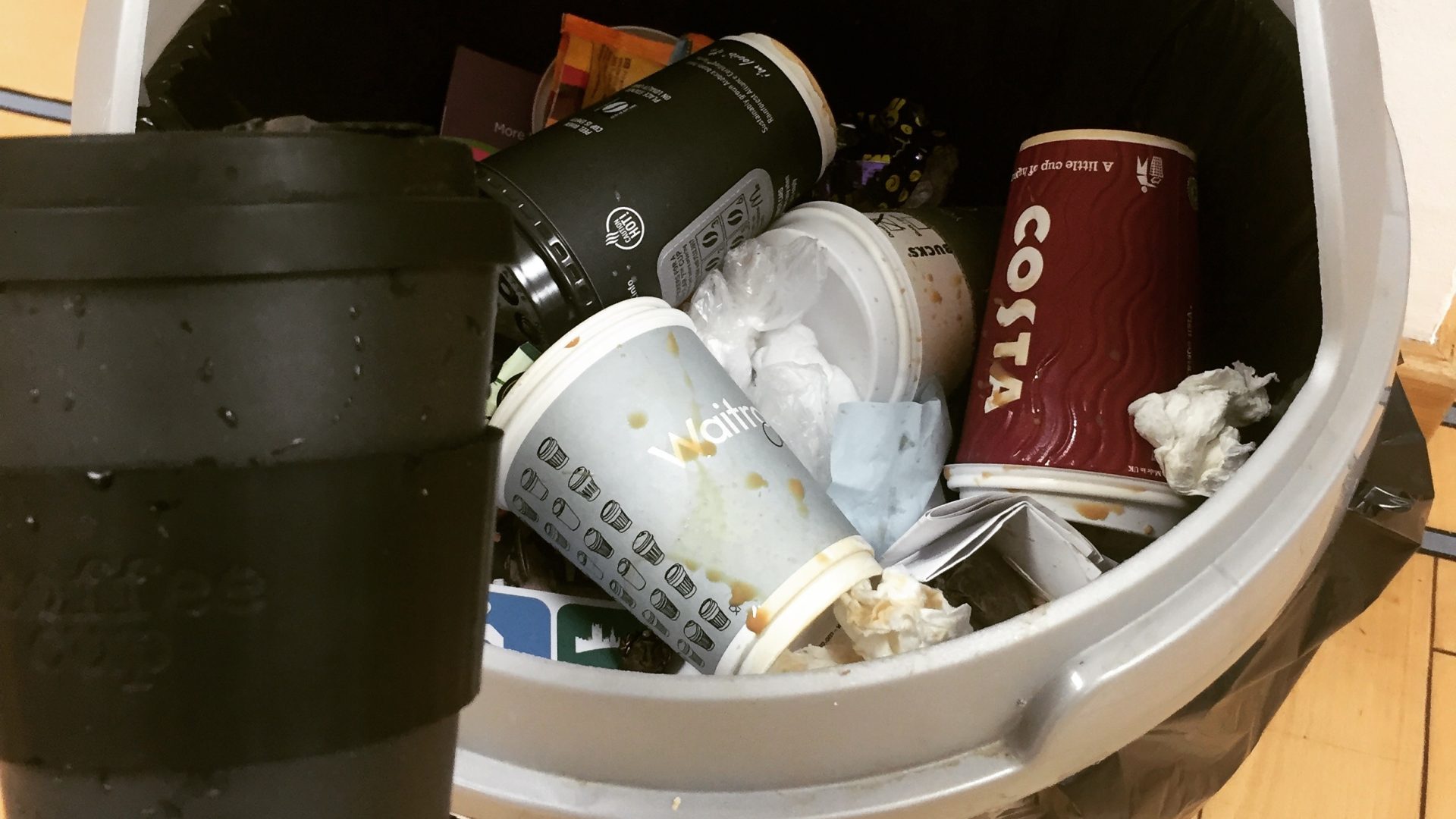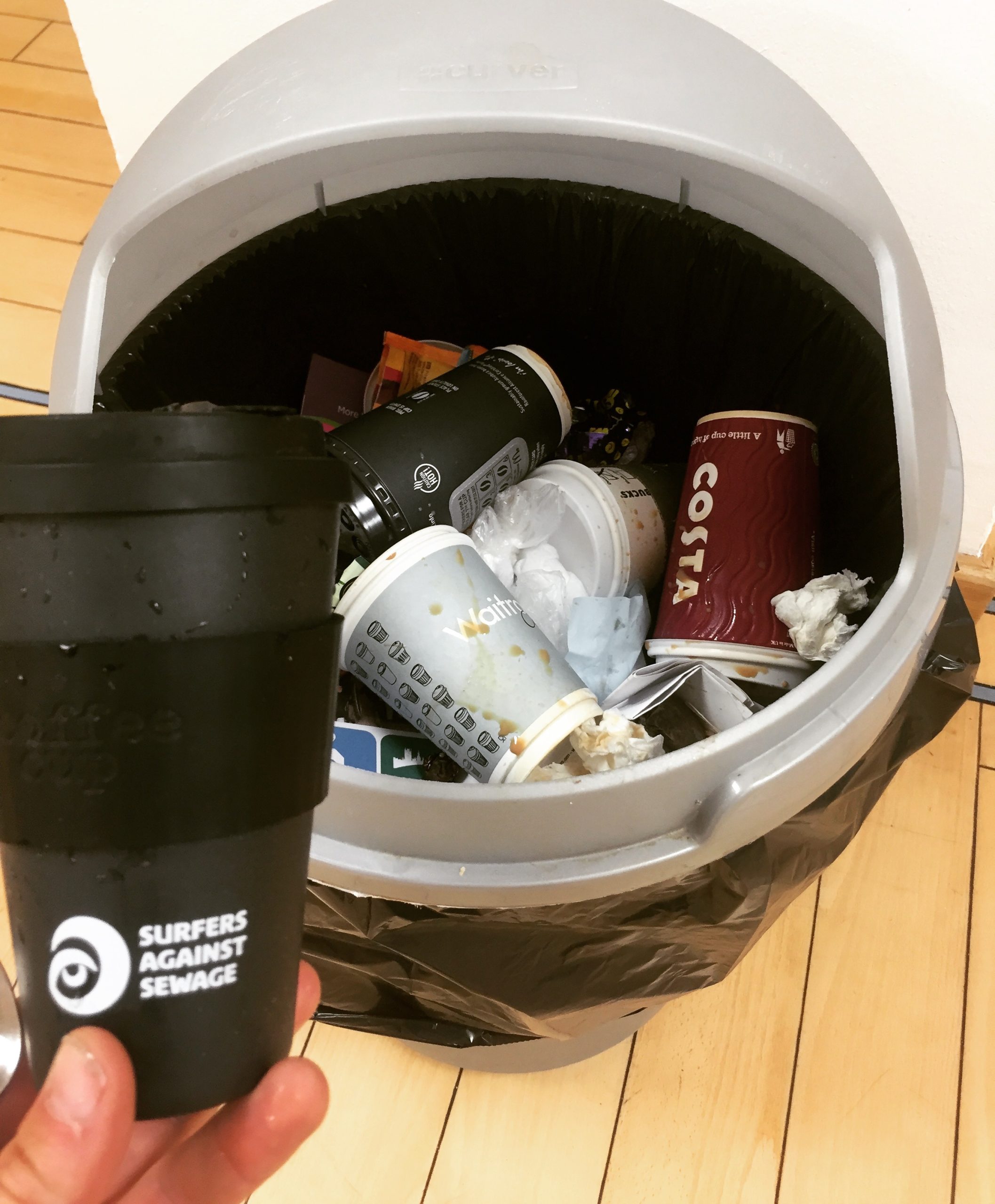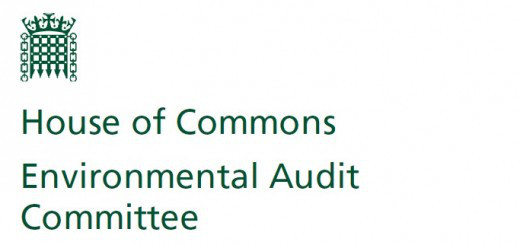
MPs call for 25p charge on disposable coffee cups
SAS welcome a new Environmental Audit Committee report which addresses potential solutions to the 2.5 billion coffee cups that are thrown away in the UK every year.
Today the Environmental Audit Committee publishes its report investigating ways to reduce the number of Coffee Cups used and thrown away in the UK. This is the second report to be produced following a major inquiry into packaging which also outlined recommendations to reduce Plastic Bottle Waste.
SAS welcome this new report which addresses potential solutions to the 2.5 billion coffee cups that are thrown away in the UK every year. Coffee cups are often layered with thin plastic and complicated to recycle. The recommendations from this report will significantly reduce the impact of coffee cups on the environment and help our work towards Plastic Free Coastlines.

The UK throws away 2.5 billion coffee cups every year
The Committee has called on the Government to:
- Introduce a 25p “latte levy” on disposable coffee cups, and use the money raised to improve the UK’s recycling ‘binfrastructure’ and reprocessing facilities.
- Set a target that all disposable coffee cups should be recycled by 2023. If this target is not achieved, the Government should ban disposable coffee cups.
- Make producers pay more for packaging which is difficult to recycle.
- Improve labelling to educate consumers about how best to dispose of their cup.
Environmental Audit Committee Chair, Mary Creagh MP, said:
“The UK throws away 2.5 billion disposable coffee cups every year; enough to circle the planet five and a half times. Almost none are recycled and half a million a day are littered. Coffee cup producers and distributors have not taken action to rectify this and Government has sat on its hands.
“The UK’s coffee shop market is expanding rapidly, so we need to kick start a revolution in recycling. We’re calling for action to reduce the number of single use cups, promote reusable cups over disposable cups and to recycle all coffee cups by 2023.”

EAC Coffee Cup Recommendations
Coffee cup charge
Although some coffee shops provide discounts for customers who bring their own cup, uptake of these offers is low at only 1-2% of coffee purchases. The Committee noted the impact on consumer behaviour of the plastic bag charge (which reduced plastic bag usage by over 83% in the first year), and concluded that consumers are more responsive to a charge than a discount.
The Committee is urging the Government to introduce a 25p charge on disposable cups, to be paid for on top of the price of a coffee. The revenue should be used to invest in reprocessing facilities and binfrastructure to ensure that disposable cups and other food and drink packaging is recycled. As the recycling rate for coffee cups improves, the charge could be lowered.
100% recycling target and potential ban
The UK throws away 2.5 billion disposable coffee cups every year. Almost all are incinerated, exported or landfilled. Half a million cups are littered every day, which spoils our streets, harms our wildlife and pollutes our seas. Coffee cups are difficult to recycle, but not impossible. Industry action has been voluntary, non-committal and slow. The Committee urges the Government to set a target that all disposable coffee cups should be recycled by 2023. If this target is not achieved, the Government should ban them.
Producer Responsibility
The plastic liner in coffee cups makes them costly to recycle, but businesses supplying and producing them don’t bear the full environmental costs of their disposal. The Committee heard that the UK’s producer responsibility obligations, which aim to make producers financially responsible for the disposal of their packaging, “fail the Ronseal test.” Packaging producers only pay for 10% of the cost of packaging disposal and recycling, leaving taxpayers to pay for the remaining 90%.
The Committee is calling on the Government to adopt a producer responsibility compliance fee structure that rewards design for recyclability and raises charges on packaging that is difficult to recycle.
Labelling: Recyclable but not recycled
Disposable coffee cups are technically recyclable, but most are not recycled. This is because of the cups’ tightly bonded plastic (polyethylene) liner and the complications of recycling packaging contaminated by food or drink. The UK only has three recycling facilities that can split out the paper and plastic components of coffee cups for recycling. This results in less than 1% of coffee cups being recycled. Most people, however, dispose of their coffee cups in recycling bins believing that they will be recycled.
The Committee has called on the Government to require coffee cups from cafes without in-store recycling systems to be printed with “not widely recycled” labels to boost consumer awareness. Cafes with in-store recycling systems should print their cups with “recyclable in store only.”
Surfers Against Sewage welcomes the publication of the Environmental Audit Committee report Disposable Packaging: Coffee Cups and its recommendations that call on the Government to tackle coffee cup waste. Introducing levy’s to coffee cups could make a real difference to consumers remembering and using their reusable coffee cups and eliminate the need for disposables. Improving understanding of recycling for customers is essential to ensure our recycling infrastructure can function efficiently with the best possible materials reaching this final stage of waste hierarchy.
